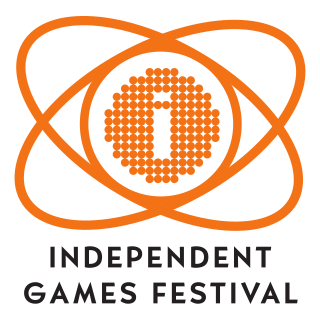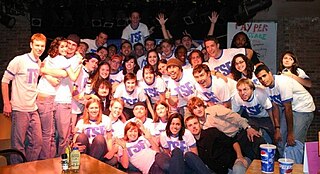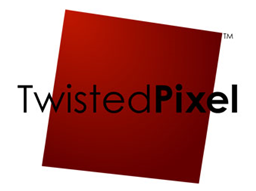
The Independent Games Festival (IGF) is an annual festival at the Game Developers Conference (GDC), the largest annual gathering of the independent video game industry. Originally founded in 1998 to promote independent video game developers, and innovation in video game development by CMP Media, later known as UBM Technology Group, IGF is now owned by Informa after UBM's acquisition.

Battlefield 1942 is a 2002 first-person shooter video game developed by Digital Illusions CE and published by Electronic Arts for Microsoft Windows and Mac OS X. The game can be played in single-player mode against the video game AI or in multiplayer mode against players on the Internet or in a local area network. It is a popular platform for mod developers, with many released modifications that alter the gameplay and theme.
Video game modding is the process of alteration by players or fans of one or more aspects of a video game, such as how it looks or behaves, and is a sub-discipline of general modding. Mods may range from small changes and tweaks to complete overhauls, and can extend the replay value and interest of the game.

The Doomsday rule, Doomsday algorithm or Doomsday method is an algorithm of determination of the day of the week for a given date. It provides a perpetual calendar because the Gregorian calendar moves in cycles of 400 years. The algorithm for mental calculation was devised by John Conway in 1973, drawing inspiration from Lewis Carroll's perpetual calendar algorithm. It takes advantage of each year having a certain day of the week upon which certain easy-to-remember dates, called the doomsdays, fall; for example, the last day of February, April 4 (4/4), June 6 (6/6), August 8 (8/8), October 10 (10/10), and December 12 (12/12) all occur on the same day of the week in any year.
A mòd is a festival of Scottish Gaelic song, arts and culture. Historically, the Gaelic word mòd, which came from Old Norse mót, refers to a Viking Age Thing or a similar kind of assembly. There are both local mòds, and an annual national mòd, the Royal National Mòd. Mòds are run under the auspices of An Comunn Gàidhealach. The term comes from a Gaelic word for a parliament or congress in common use during the Lordship of the Isles.

Dystopia is a team-based, objective-driven, first-person shooter video game, developed as a total conversion modification on the Valve's proprietary Source engine. It is based on the cyberpunk literary and aesthetic genre; it is somewhat based on popular role-playing game Shadowrun, created by an amateur development team and released to the public for free. Its first playable build was released on September 9, 2005, after a year of planning and nine months of development. The first full version of Dystopia, Version 1, was released after 3 years of development on February 25, 2007.
The Hidden is a multiplayer total conversion mod for the popular Half-Life 2 computer game. The gameplay revolves around the retrieval of an escaped research subject where the subject is highly agile, incredibly strong, and nearly invisible. The first beta version was released on June 13, 2005 and its latest release was September 8, 2007.

Bleach: Dark Souls, known in Japan as Bleach DS 2nd Kokui Hirameku Requiem is the second Bleach game for the Nintendo DS. The game introduces new characters, and adds new moves for the older characters as well as introducing new game modes. Bleach: Dark Souls also includes Hollows of varying sizes, for players to fight. The number of Reifu cards in-game are also increased from the original, and more cards are displayed on the touch screen during battle. The Wi-Fi battle mode has been improved to make it easier to play online. The game's theme song is "Resistance" by High and Mighty Color.
DeFRaG is a free software modification for id Software's first-person shooter computer game Quake III Arena (Q3A). The mod is dedicated to player movements and trickjumping. It aims at providing a platform for self-training, competition, online tricking, machinima making, and trickjumping. Hence it constitutes an exception among other Q3A mods.

Theatre Strike Force is the University of Florida's premier improv and sketch comedy troupe. The group also goes by TSF. The style of improv performed by Theatre Strike Force is a combination long form and short form. They both teach and perform improvisational comedy. They have six house teams which include both forms of improv as well as a sketch team. There are four long form house teams which are cast every semester and usually have six to eight members. The TSF Short Form Team is cast every semester as well and usually has fifteen to nineteen members. TSF Sketch is the final house team and usually has twelve to sixteen members, cast each semester.

Piranha Games Inc. is a Canadian video game developer based in Burnaby, British Columbia. The company was founded by Russ Bullock, President and Executive Producer, and Bryan Ekman, VP and Creative Director. Piranha Games is one of the oldest game developers in the Greater Vancouver area and was housed in the International Village Mall in the Chinatown area until their relocation to their current Burnaby headquarters. On 25 November 2020, Piranha Games entered into an agreement to be acquired by Enad Global 7.
Beyond the Red Line was a total conversion for the game FreeSpace 2, based on the reimagined TV show Battlestar Galactica. It allows players to fly into combat as either a Colonial Viper pilot or a Cylon raider.

Flipside is a mod for the video game Half-Life 2. It is a cardboard-themed side-scrolling platform game with the ability to turn the camera around 180 degrees to view the 2d cardboard world from the opposite side. Flipside was developed by Danish studio Team 3, a group of students from DADIU and released June 18, 2007.

Garry's Mod is a 2006 sandbox game developed by Facepunch Studios and published by Valve. The base game mode of Garry's Mod has no set objectives and provides the player with a world in which to freely manipulate objects. Other game modes, notably Trouble in Terrorist Town and Prop Hunt, are created by other developers as mods and are installed separately, by means such as the Steam Workshop. Garry's Mod was created by Garry Newman as a mod for Valve's Source game engine and released in December 2004, before being expanded into a standalone release that was published by Valve in November 2006. Ports of the original Windows version for Mac OS X and Linux followed in September 2010 and June 2013, respectively. As of September 2021, Garry's Mod has sold more than 20 million copies. A successor, Sandbox, has been in development since 2015.

Mechwarrior: Living Legends is a free, fan-created multiplayer-only game based in the BattleTech universe - originally a total-conversion mod for Crysis, it's since become stand-alone - running on Crysis Wars, and using CryEngine 2 as its engine. It's one of the few mods based on the BattleTech universe to have been sanctioned by Microsoft—who currently owns the rights to the Mechwarrior video-game franchise—and additionally received pre-SDK support and sanctioning directly from Crytek, producers of the games' engine. On December 26, 2009, an open beta was released via BitTorrent and other distribution methods. Because the project changes the play-style and feel of the game it is originally based on so completely as to be unrecognizable in comparison, it is billed as a "full-conversion" mod, since little to no trace of the original game's art or play-style exists any longer within MW:LL. It was created by American developer Wandering Samurai Studios.

Twisted Pixel Games, LLC is an American video game developer based in Austin, Texas. Originally a contractor, Twisted Pixel releases games based on its own intellectual properties such as The Maw and 'Splosion Man. The company uses its own proprietary engine, known as Beard, to power its games. On October 12, 2011, it was announced that Twisted Pixel had become part of Microsoft Studios. However, Twisted Pixel separated from Microsoft, and became an independent company again on September 30, 2015. In November 2021, the company became a subsidiary of Oculus Studios.
Lotus Creative Entertainment is a Canadian video game development company based in Vancouver, British Columbia, Canada. Founded in 2004 by team lotus, and made famous by the mod Path of Vengeance, which won the Independent Games Festival 2006 Best Unreal Tournament 2004 Modification award.

Dear Esther is a 2012 adventure game developed and published by The Chinese Room. First released in 2008 as a free modification for the Source game engine, the game was entirely redeveloped for a commercial release in 2012. The commercial version was released for Microsoft Windows in February 2012 and OS X in May 2012; ports for PlayStation 4 and Xbox One were released by Curve Digital in September 2016.
The Chinese Room is a British video game developer based in Brighton that is best known for exploration games. The company originated as a mod team for Half-Life 2, based at the University of Portsmouth in 2007, and is named after John Searle's Chinese room thought experiment. In August 2018, it became a subsidiary of Sumo Digital.










